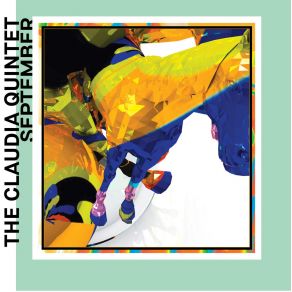September
Download links and information about September by The Claudia Quintet. This album was released in 2013 and it belongs to Jazz, Avant Garde Jazz, Classical genres. It contains 10 tracks with total duration of 01:07:14 minutes.

|
|
|---|---|
| Artist: | The Claudia Quintet |
| Release date: | 2013 |
| Genre: | Jazz, Avant Garde Jazz, Classical |
| Tracks: | 10 |
| Duration: | 01:07:14 |
| Buy it NOW at: | |
| Buy on iTunes $9.99 | |
| Buy on Amazon $8.99 | |
| Buy on iTunes $9.99 | |
Tracks
[Edit]| No. | Title | Length |
|---|---|---|
| 1. | September 20th Soterius Lakshmi | 2:35 |
| 2. | September 9th Wayne Phases | 10:36 |
| 3. | September 25th Somber Blanket | 6:27 |
| 4. | September 29th, 1936 "Me Warn You" | 10:26 |
| 5. | September 22nd Love Is Its Own Eternity | 4:48 |
| 6. | September 18th Lemons | 10:35 |
| 7. | September 17th Loop Piece | 6:53 |
| 8. | September 24th Interval Dig | 6:24 |
| 9. | September 16th Mystic Klang | 2:48 |
| 10. | September 12th Coping Song | 5:42 |
Details
[Edit]Marking the transition from summer to fall, September is a special month for drummer/composer John Hollenbeck, special enough to provide the title for this 2013 Claudia Quintet album, the group's sixth Cuneiform release and seventh overall. In the liner notes, bandleader Hollenbeck explains that his artist residencies during September provide "alone time" for composing amidst some quite beautiful surroundings. September, the album, reflects those times when creativity flourishes and the air alternates between warm and chilly, but also when events alter lives forever. Recording largely without written scores, Claudia's lineup of Hollenbeck, reedman Chris Speed, Drew Gress or Chris Tordini on bass, accordionist Red Wierenga (replacing Ted Reichman), and vibraphonist Matt Moran — with no guest appearances this time — is ideally suited to capturing the tones and timbres that the month signifies. "25th: Somber Blanket" (each track begins with a composition-related date) is calming in its measured pace of bass and accordion, crystalline in its clarity of vibes and clarinet, as Hollenbeck's drum patter rains into the mix before all the bandmembers coalesce into one of the album's loveliest buildups. Beginning with a composed but improvised-sounding showcase for Gress, with Hollenbeck soon joining him to punch up the rhythmic accents, "24th: Interval Dig" finds the band at its most animated, the bassist and drummer spurring on energized solos from Moran and Speed (on tenor).
Inspired by Wayne Shorter, "9th: Wayne Phases" builds angular layers over rolling percussion before a quick collective flurry launches a nimble-fingered accordion solo from Wierenga. Moran flies across the vibes later on as Hollenbeck and Tordini race forward until a descending four-note tenor/accordion figure shifts the rhythm back toward the theme; Speed's tenor then enters choppily, growing ever more turbulent as the band builds from near stasis to a smashing finale. Beginning with repeated short clarinet, vibes, and accordion phrases marking harmonic shifts against a bass-drum groove, "18th: Lemons" initially displays Claudia's jazz-meets-post-minimalism side before flirting with dissonant free improv and concluding forcefully, more of a foot pounder than a toe tapper, while Hollenbeck's marriage of jazz and experimentalism is most fully realized in "29th, 1936: 'Me Warn You.'" The track's music is structured around repetitive sampled bits of Franklin D. Roosevelt's 1936 Democratic Convention speech in Syracuse, New York, in which the campaigning president railed against the Republican Party's maliciousness. Claudia's phrasing effectively matches the chopped-up samples, shifting into an evocative backdrop for a more extended speech passage until, after a band-only interlude, the cadences of music and voice fully integrate, seeming to carry FDR's message emphatically into 2013. Manifesting Hollenbeck's belief in the power of music to lift and heal, the day-after rumination "12th: Coping Song" concludes September with both remembrance and a forward gaze. Long melodic lines float over an ostinato as insistent as a nagging memory before something calmer emerges, with Wierenga's accordion nearly traditional in tone and form. When Gress resumes the ostinato, it seems to carry the band — and the listener — elsewhere.